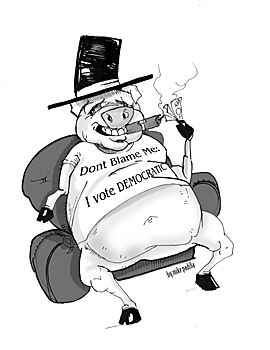
Illustration by Mike Padilla
|
|
By Jonathan Riches
Arizona Daily Wildcat
Monday, April 18, 2005
Print this
By all accounts, the presidential inauguration celebration of Gen. Andrew Jackson was a wild affair. When Gen. Jackson of Tennessee defeated John Quincy Adams of Massachusetts in the election of 1828, the modern Democratic Party was born. That election, which has been described as the first triumph of the common man in American politics, pitted the moneyed interests of the Northeast against the rural interests of farmers and laborers from the South and West.
But somewhere in the last century and a half, the whiskey-slamming, farm-working, back-slapping Democrats of old have been replaced by green-tea-sippin', modern-art-buying, NPR-listening, progressive liberals. Massachusetts millionaires, academic experts and Hollywood crazies have taken control of the "people's party." Urban snobbery has somehow replaced rural pragmatism as the dominant Democratic creed.
At the same time, country club Republicans are a dying breed, or at the very least, what is left of them now play second-fiddle to NASCAR Republicans when conservative politicians go vying for support.
As a result, the old perception of Republicans as the party of the wealthy and Democrats as the party of the common man is now about as accurate as the CIA's weapons of mass destruction. In fact, the last few decades have revealed a fundamental realignment of the electoral map and a new wave of party leadership. Entire blocs of "common man" voters - police officers, construction workers, housewives, rural residents and military veterans - have drifted to the Republican Party. Simultaneously, large portions of America's wealthy elite - trial lawyers, media moguls, academics, Hollywood executives, even Wall Street financiers - have begun to vote Democratic.
Research from the Ipsos-Reid polling firm suggests that these perceptions are more than just allegorical. In counties that voted strongly for George W. Bush in the 2000 elections, only 7 percent of voters earned at least $100,000, while 38 percent had household incomes below $30,000. In pro-Gore counties, 14 percent of voters made more than $100,000, while 29 percent earned less than $30,000. Both parties have their fat cats, but this data suggests that wealthy Americans now vote Democratic over Republican by a 2-to-1 margin.
Even among the wealthiest political donors, Democrats are still more likely to outnumber Republicans. One good example is trial lawyers - who contribute some of the largest sums to political campaigns. By the summer of 2004, law partners had donated $112 million to the presidential political candidates. By contrast, the entire oil and gas industry donated only $15 million. And, as should be no surprise, 71 percent of the money from wealthy lawyers goes to Democrats, while only 29 percent goes to Republicans.
The divide, however, is more than just economic.
One glance at an electoral map from the 2004 election indicates that Democrats may have gained the wealthy, but they have lost the heartland. Those maps show a red expanse of Bush states across most of America, with Kerry states along the coasts and the Great Lakes.
John Kerry, in fact, is the perfect embodiment of the new takeover of the Democratic Party by rich elites. If elected, Sen. Kerry would have been the richest president in the history of the United States. His Senate and Democratic colleagues, Jon Corzine and Jay Rockefeller, are also among some of the wealthiest politicians in Washington.
However, according to an article by Karl Zinsmeister of The American Enterprise: "It's not as if the Democrats have taken over the top of the socio-economic ladder and the Republicans the bottom. Rather, Democrats dominate the very upper and lowest rungs, while Republicans find their following in the middle."
So, what happened to the party of Andy Jackson, John F. Kennedy and Harry Truman? When did the Democrats begin to alienate the apolitical moderates and become so, well, elitist? How is it that the parties have switched positions on the common man-rich guy divide?
Of course, not all Democrats have been drawn to this liberal elitism. There are still many moderates within the party and many more outside of it with leftward leanings. If the Democratic Party is ever going to appeal to mainstream America again, it is up to those individuals to take the party back from the elitists who have permeated its ranks.
In the meantime, we would all be wise to take our respective political compasses in for a little readjustment. And, if the Democrats have learned from the last round of elections, they will do the same.
Jonathan Riches is a first-year law student. He can be reached at letters@wildcat.arizona.edu.
